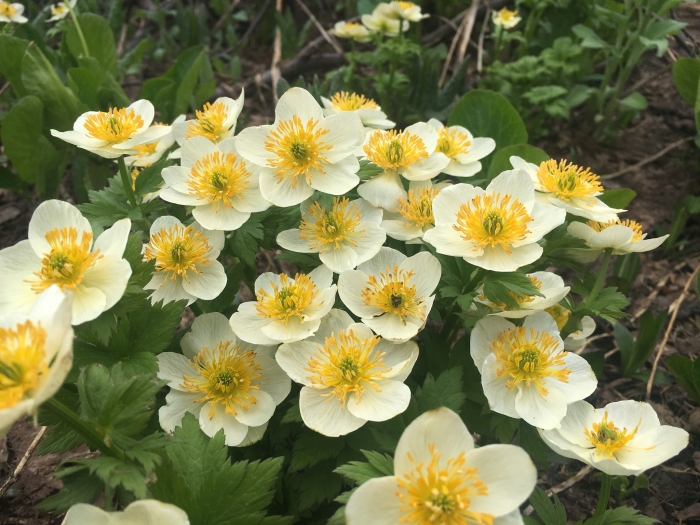American Globeflower
(Trollius laxus)
American Globeflower (Trollius laxus)
/
/

Matt Berger
CC BY 4.0
Image By:
Matt Berger
Recorded By:
Copyright:
CC BY 4.0
Copyright Notice:
Photo by: Matt Berger | License Type: CC BY 4.0 | License URL: http://creativecommons.org/licenses/by/4.0/ | Rights Holder: Matt Berger | Publisher: iNaturalist | Date Created: 2017-06-21T15:39:58-07:00 |
















































Estimated Native Range
Summary
Trollius laxus, commonly known as American Globeflower, is a deciduous perennial herb that is native to moist meadows, wetlands, and stream banks in the cool temperate regions of the Northeastern United States. It typically grows to a height of 1-2 feet with a similar spread and is characterized by its thick, fibrous roots and basal leaves. The plant produces one or more stems, each topped with a showy, globular, bright yellow flower up to 5 cm in diameter, consisting of 5-7 petaloid sepals. The American Globeflower is one of the first plants to bloom in the spring, signaling the arrival of the new season.
The American Globeflower is valued for its early spring blooms and its ability to thrive in moist, shady conditions, making it suitable for woodland gardens, bog gardens, and areas near water features. It requires consistently moist soil and benefits from being planted in part shade to full shade, which mimics its natural habitat. While it is not commonly used in large-scale landscaping, it can be a charming addition to specialized plantings where its unique flowers can be appreciated. Care should be taken to ensure adequate water, especially in drier climates. It is not known for serious disease or pest issues, but it can suffer in overly dry or sunny locations.CC BY-SA 4.0
The American Globeflower is valued for its early spring blooms and its ability to thrive in moist, shady conditions, making it suitable for woodland gardens, bog gardens, and areas near water features. It requires consistently moist soil and benefits from being planted in part shade to full shade, which mimics its natural habitat. While it is not commonly used in large-scale landscaping, it can be a charming addition to specialized plantings where its unique flowers can be appreciated. Care should be taken to ensure adequate water, especially in drier climates. It is not known for serious disease or pest issues, but it can suffer in overly dry or sunny locations.CC BY-SA 4.0
Plant Description
- Plant Type: Herb
- Height: 1-1.6 feet
- Width: 2-3 feet
- Growth Rate: Moderate
- Flower Color: Yellow
- Flowering Season: Spring, Summer
- Leaf Retention: Deciduous
Growth Requirements
- Sun: Part Shade, Full Shade
- Water: High
- Drainage: Medium, Slow
Common Uses
Low Maintenance, Rabbit Resistant, Showy Flowers, Water Garden
Natural Habitat
native to moist meadows, wetlands, and stream banks in the cool temperate regions of the Northeastern United States
Other Names
Common Names: American Spreading Globeflower , Spreading Globeflower , Blek Smörskål
Scientific Names: Trollius laxus , Trollius americanus
GBIF Accepted Name: Trollius laxus Salisb.